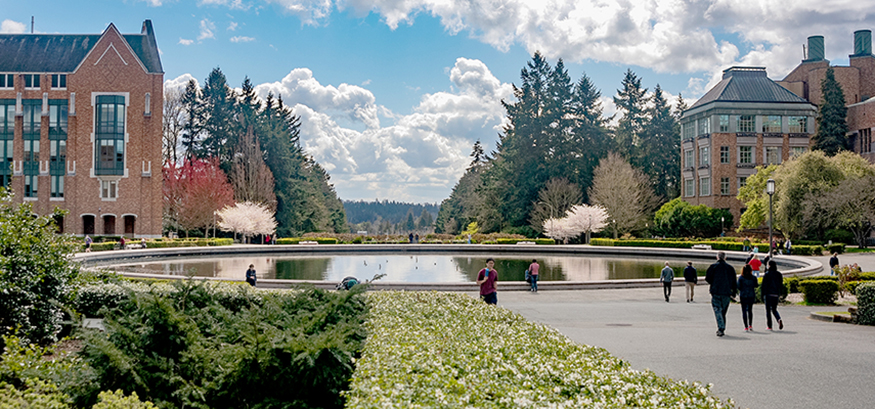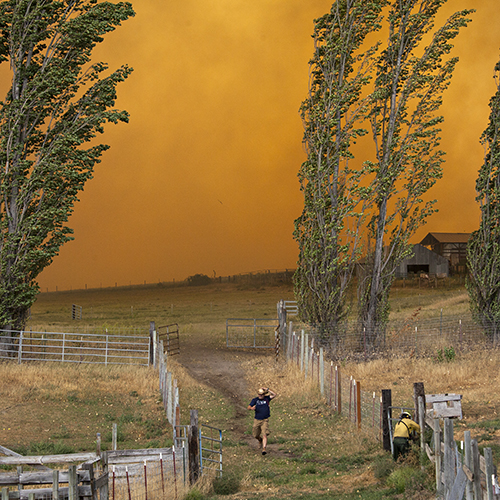
If you could design a university today, unfettered by past practices, where would you start? What would you prioritize? Who would you invite into the conversation? A group of faculty in the University of Washington College of Arts & Sciences, known as the Dean’s Academy Futurists, are taking on that challenge. They are imagining what higher education might look like after 2050 and envisioning new models for the liberal arts. The College recently received a $150,000 grant from the Mellon Foundation to support the Futurists’ work over the next two years.
The Futurists are one pillar of a larger initiative, Rethinking the Academy, launched by Arts & Sciences Dean Dianne Harris to create opportunities to envision the near and longer-term futures of teaching, learning, and research in the College.
The Futurists’ initial focus will be the future of the humanities. Current challenges in the humanities include declining majors, fewer graduates, and continual questions about the legitimacy and relevance of humanities disciplines. Through intensive, multi-day off-site sessions, the Futurists will examine and question the current practice of the humanities and a liberal arts education at the UW and generate ideas and prototypes for alternative approaches.
“We have never wavered in our belief that the flourishing of a democratic and humane society requires the skills that the humanities provide,” says Harris. “But we do not believe that the current practice is the only way to do that work. This funding provides the resources we need to think creatively and in fresh ways about how we work and the structures that organize higher education today.”
This is a long-term project, venturing into new territory. The College is grateful for the Mellon Foundation’s support as we take on this exciting experiment.
Over the course of the past year, the College launched the pilot phase of the Dean’s Academic Futurists’ work, which included establishing a shared mission, engaging with principles of Futurist thinking and action, and governance to guide their ongoing efforts. Over the next two years, with Mellon Foundation support, the Futurists will hold three off-site multi-day meetings annually and expand their range of ideas by including colleagues from outside the UW at these sessions and at separate, externally-oriented events.
“It is difficult to see a different future while we are so deeply immersed in the day-to-day work and demands of the present,” says Kevin Mihata, associate dean for undergraduate education in the College of Arts and Sciences and the principal investigator for the Mellon grant. “We need to keep the current system running. But imagining a new system is a separate task unto itself. This project creates the dedicated time and space for Futurists to do that new work.”
An upcoming Futurist session will feature Sally Jewell, former US Secretary of the Interior and former CEO of REI, who will lead conversations about her experiences with futurist thinking in the contexts of her work in the federal government and in the corporate world.
At separate community events, the Futurists will bring the larger UW and external community into their work. These events will incorporate more voices, from local Native communities to technology companies, to integrate perspectives beyond the academy and to explore potential partnerships.
“This is a long-term project, venturing into new territory,” Harris said. "The College is grateful for the Mellon Foundation’s support as we take on this exciting experiment.”
Learn more about the Dean’s Academy Futurists and the Rethinking the Academy initiative.
More Stories

What Students Really Think about AI
Arts & Sciences weigh in on their own use of AI and what they see as the benefits and drawbacks of AI use in undergraduate education more broadly.

10 Arts & Sciences Stories from 2025
As 2025 comes to a close, we're sharing some of the year's top Arts & Sciences stories.

A Healing Heart Returns
In February, the UW Symphony will perform a symphony that Coast Salish elder Vi Hilbert commissioned years ago to heal the world after the heartbreak of 9/11. The symphony was first performed by the Seattle Symphony in 2006.
